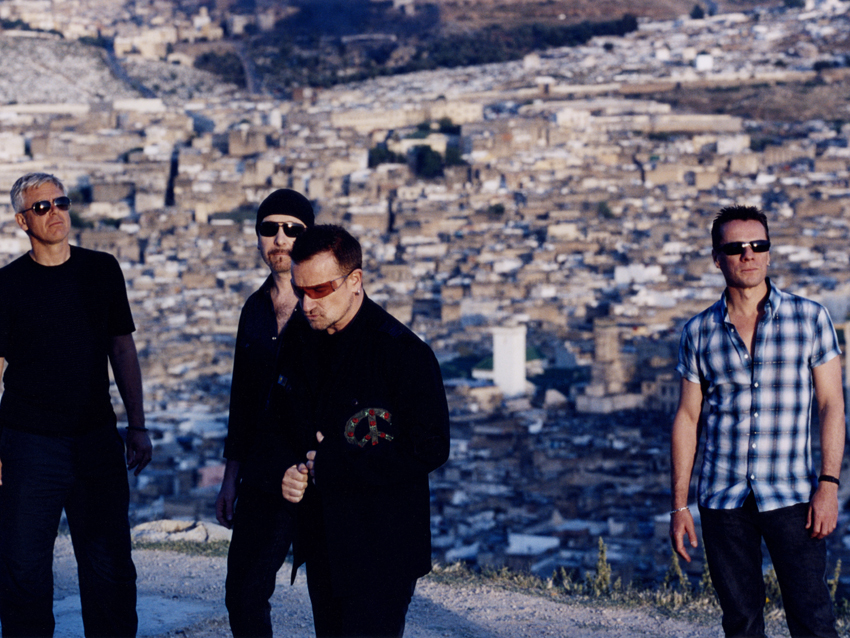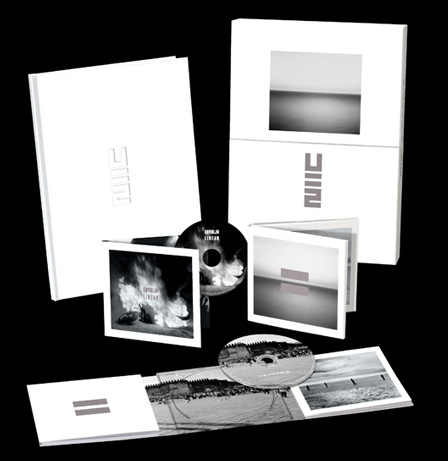
Over the years, people have lost interest in the album format. Because of iTunes and various other digital music services, ordering up a current hit song or two and ignoring the filler tracks on a record has become standard practice.
It's almost as if finger-touch technology has brought the future back to the past and we're in the pre-Beatles era, where singles - from Elvis to Buddy Holly to Frankie Avalon - ruled the day and albums were pumped out as novelties, quick cash-in merch.
The album as an art form? That doesn't happen anymore, right?
Throughout their career, U2 never gave up on the long-player as art - and, for a time, neither did their audience. Records such as War, The Unforgettable Fire, The Joshua Tree and Achtung Baby were revered as complete works, with each song viewed as inseparable from the other. But now it seems as if listeners have lost hope, as if those albums are now relics and nothing can possibly be as good as it was then.
The rough reinvention
Falling back in love with their original sound, U2 discovered the band they were meant to be
From the high of Achtung Baby, U2 were in for a rough ride through much of the '90s. Reinvention of their traditional sound - discarding it altogether, really - quickly led them into a cul-de-sac.
They stumbled hard on the tentative, fumbling, intentionally ironic Pop and the tour that followed - the first time in years they failed to pack venues - but corruption at that point in their career seemed almost inevitable, and hence something we could deal with, as long as they got back to serious, heartfelt business, which they did on All That You Can't Leave Behind.
Flirting with their original sound, dancing with it, embracing it and finally falling back in love with it in a way audiences always hoped they would - much of it based on the shoulders of The Edge and his revolutionary and much-copied use of echo-driven note patterns - they discovered the band they always were and were meant to be.
Want all the hottest music and gear news, reviews, deals, features and more, direct to your inbox? Sign up here.
Since then, they haven't lost the plot.
Big emotions, big sound
Bono is one of those rare singers who can make feelings jump through his skin. Whether it's an economical gesture or a grand wail, he conveys his lyrics as if electrically prodded. His performances are a turn, but they're inseparable from his role as U2's front man. The part calls for big emotions, big ideas - and a sound big enough to support them.
They're all there in full-scale Technicolor on U2's new album, No Line On The Horizon, their first in nearly five years. To call it the band's greatest album since Achtung Baby is reasonable enough. But it also just might be the greatest record U2 have made thus far.
'Horizon' comes off as effortless and seamless as The Joshua Tree, which seemed to spill out of U2
I've listened to No Line On The Horizon three times now - and once was enough for me to place it alongside U2's towering achievements.
While it's no secret that the band labored over the album - marathon recording session in various cities, and some aborted sessions with producer Rick Rubin (hopefully, we'll hear those outtakes one day on an expanded collection; or perhaps somebody will leak them), the results hardly sound labored; in fact, the album comes off as effortless and seamless, as free-flowing as The Joshua Tree, which seemed to spill right out of them.

The super-deluxe set (above)
Working with their most trusted trio of confidants and collaborators, Brian Eno, Daniel Lanois and Steve Lillywhite (Eno and Lanois even share songwriting and playing credits), U2 have created a work of atmospheric eroticism and sustained emotional substance. Overall, it's probably the dirtiest sounding album they've ever made, but it's one in which all of the elements they've succeeded in - jarring guitars clashing with surrealistic electronica over tight pop and big anthems - come together with supreme grace and majesty.
Why anybody would download an appetizer of a single is beyond me when they can feast on a full course meal of an album this rich and sumptuous. It's a turn-on all right, but for all of its machinery, it's hardly mechanical.
Quite possibly, it's U2's most earthy and liberating album, and certainly a signal to every other band out there with bold ambitions and dreams of shocking the world with great art: Go ahead, be bold, be audacious, be fearless. It can be done. Here's how.
Bono looms large
"I know a girl who's like the sea/ I watch her changing every day for me" Bono sings in the opening, jarring title cut. The grinding power of the instrumentation, by turns techno and retro-rock, driven by a forceful guitar line, is urgent, and it shakes you like a 3am phone call. Bono doesn't let up; he charges at you with the same wicked intensity as Mick Jagger did on Beggar's Banquet, and you feel his desperation in the pit of your stomach.
Bono's voice has matured, but it's gained depth and strength
"Every night I have the same dream/ I'm hatching some plot, scheming some scheme," he sings towards the end. The same man who now has world leaders on his BlackBerry can still dial into raw urges like a man left all alone with his racing thoughts and nothing more.
As a singer, Bono's presence looms large. His voice has matured - there's a certain kind of ragged world-weariness that is to be expected with the passage of time - but it's gained depth and strength. Whereas age is usually a killer to vocalists, some singers (think Johnny Cash in his autumn years; his booming yet fragile baritone ate microphones) make it work for them. Bono is headed in this direction.
This is The Edge!
The Edge pursues sounds both pure and unnatural. His trademark guitar lines ring out like gunshots
Still, The Edge stands his ground, and the resolve with which he pursues sounds both pure and unnatural - his trademark guitar lines on Magnificent (a echo-laden stadium slammer), Unknown Caller and Breathe ring out like gunshots, each note hitting its mark - continues to be his greatest gift.
The Edge's contributions cannot be overstated. In his hands, a guitar is an instrument of change, one which can alter the senses - on the title cut, distorted guitars slam against one another; it's like you're in a cave filled with amps, and you can't tell where the sounds are coming from, because they're everywhere.
But he's capable of subtler tricks too: Take Moment Of Surrender, for example, in which he's looking in a mirror, but he's also staring at a poster of David Gilmour and riding out a slide solo that is tubey, bluesy and oh-so-Strat-ish. It's one thing to invent a sound; it's another thing to marry it with somebody else's; and it's one quite another to turn it all into something totally new, which is what The Edge does here.
A sense of wonder and grandeur permeates the whole of Horizon. Epic hymns, ie, the "big statements," such as Moment Of Surrender (the album's emotional center, a luxurious 7-minute meditation), Unknown Caller (its intro beautifully recalling Bad until it takes off in its own direction) and FEZ - Being Born (a bit of a Roxy Music groove here, not surprising give Eno's touch) masquerade as rock, but they have a spiritual pull that suck you in and overwhelm.
On previous albums, Bono brazenly beseeched listeners to fall to their knees, but on tracks this potent, he doesn't have to ask - the impulse is instinctual.
King-sized riffs
"Let me in the sound!" Bono shouts in Get On Your Boots, and it's no empty slogan - it's an order
Since Achtung Baby, U2 have woven king-sized riffs (The Fly, Discotheque, Elevation, Vertigo) into their narrative, and songs like Get On Your Boots and Stand Up Comedy (both of which pack some in-your-face Zep-like guitar crunch that don't sound out of place) deliver yet more cock-punch chapters to the continuing story.
Detractors who dismiss these tracks as contrivances are missing out on the fact that U2 sink their teeth into them are fiercely as Jimmy Page (a recent inspiration for The Edge) and co ever did - they believe whole-heartedly in their big-time rock. "Let me in the sound, let me in the sound!" Bono shouts in Get On Your Boots, and it's no empty slogan - it's an order.
Slippery time signatures
Historically, the contributions of Adam Clayton and Larry Mullen Jr go largely unnoticed on U2 albums, and that's to be expected from non-flashy rhythm sections who do their job and don't get in the way (John McVie and Mick Fleetwood, anybody?). But expect the occasional surprise: White As Snow has a slippery time signature that will keep you scratching your head. How they follow The Edge's delicately plucked acoustic guitars is anybody's guess - or is he following them?
The album doesn't feel 'fussed over.' It arrives fully formed, the natural order in check
While U2's previous album, How To Dismantle An Atomic Bomb, won the Grammy for Album Of The Year and was universally hailed as a solid collection - and songs such as City Of Blinding Lights and Origin Of The Species, not to mention All Because Of You, are positively glittering affairs - the record felt at times like patchwork.
You could almost sense the band standing over you, analyzing its strengths and weaknesses, agonizing over the order of songs - "We need a rocker here, we need to slow it down there, does this track make any sense at all?"
No Line On The Horizon has no such baggage. It doesn't feel 'fussed over.' It arrives fully formed in the way The Joshua Tree did, its presentation complete, the natural order in check. More significantly, it's the first album in eons in which U2 aren't noticeably trying on somebody else's clothes: gone are the blues and gospel experimentations; the obvious attempts at au courant dancefloor jams, too, are nowhere to be found. These days, U2 aren't trying to be anybody but U2.
In that way, they've found what they're looking for.
Joe is a freelance journalist who has, over the past few decades, interviewed hundreds of guitarists for Guitar World, Guitar Player, MusicRadar and Classic Rock. He is also a former editor of Guitar World, contributing writer for Guitar Aficionado and VP of A&R for Island Records. He’s an enthusiastic guitarist, but he’s nowhere near the likes of the people he interviews. Surprisingly, his skills are more suited to the drums. If you need a drummer for your Beatles tribute band, look him up.
